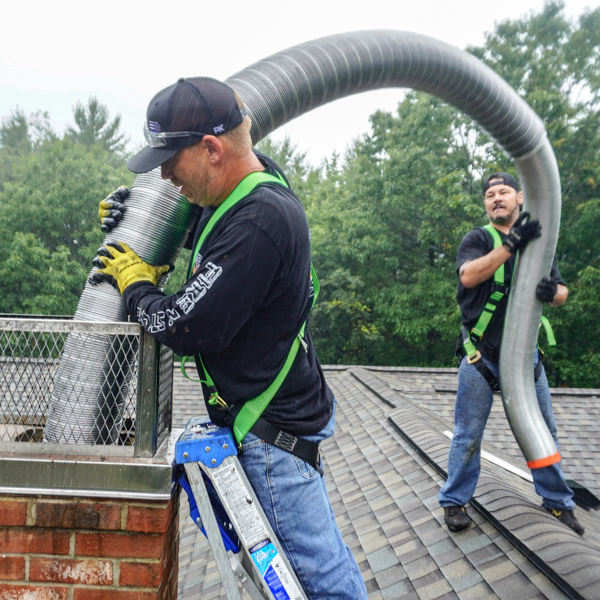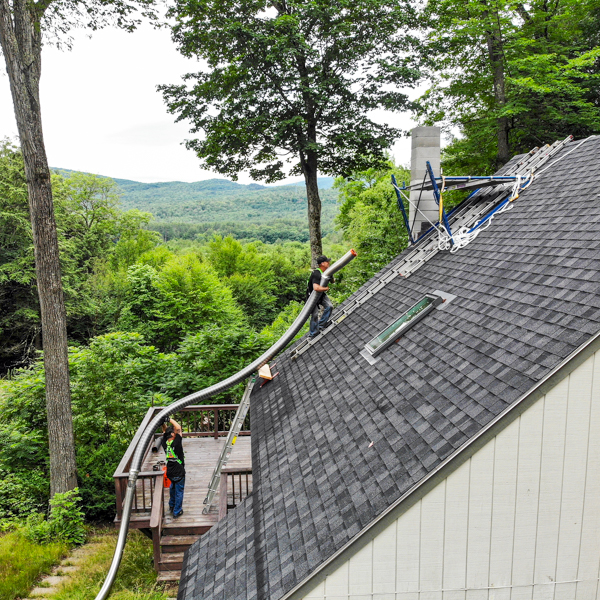Chimney Liners
Chimney liners, or flue liners, often fall into the “out of sight, out of mind” category, but this oversight can be dangerous. Chimney liners are one of the most important components of your fireplace/chimney system and help to prevent major damage to the chimney masonry and adjacent areas of your home.
Fire N’ Stone of Tilton, NH, provides our Lakes Region customers with expert chimney repair and new liner installation.
 What Is a Chimney Liner?
What Is a Chimney Liner?
Chimney liners run throughout the flue to channel smoke and combustion gases to the outside of the home. They also protect the interior masonry from heat and corrosion while providing the optimum flue size for drafting.
Think about a chimney liner as a garden hose. A garden hose is made to carry water from one end to the other and if it has breaks in it will cause leaks. A chimney liner is similar as it is carrying dangerous exhaust gases from one end to the other and any breaks will cause leaks of these gases which can not only cause damage to your home and chimney structure but can also cause serious bodily injury or even death.
Many chimneys throughout the early part of the 1900s and prior were built without a lining system. Tests by the National Bureau of Standards (NBS) have repeatedly shown that unlined chimneys are very dangerous and put the chimney, the home and the people in the home at risk.
One series of NBS tests showed that unlined chimneys causing fires in adjacent woodwork in just three and a half hours.
For decades, every fire-safety agency in the U.S. has strongly recommended including a chimney liner in the construction of all masonry chimneys. In fact, many state and municipal codes require chimney liners for all brick and mortar chimneys at the time they’re built.
Three Main Types of Chimney Liners
Most homes with chimney liners have one of three types:
Stainless steel: Considered the safest and sturdiest type of liner. They’re suitable for wood and pellet fireplaces as well as boilers and furnaces. When installed properly and well-insulated, stainless steel flue liners protect while reducing creosote buildup and condensation. In our opinion, they’re the best choice for safety and performance.
Clay tile: Past clay tile liners were very popular and are common today. Clay makes a good conduit for smoke and heat, but over time they can begin to crack, particularly during a chimney fire.
Cast-in-place: These liners are built with a cement-like material to form a seamless path for smoke and gases. They’re sturdy and durable, but installation is often challenging and cost-prohibitive.
Chimney Liner Installation & Replacement
When we add a liner to an unlined chimney or replace a damaged liner, we always recommend going with stainless steel. We use a special double-wall liner with insulation between the layers. Insulation is a requirement for chimney lining systems when they are being used for wood and pellet appliances, when they are venting a boiler or furnace with an efficiency rating greater then 84%, or when the chimney is located outside the envelope of the building structure. Our experience has shown us that insulated liners also are safer and perform better when used in any type of masonry chimney, furnace or boiler system.

A damaged chimney liner is usually spotted during a chimney inspection, which is why we strongly recommend having your chimney inspected once a year. By detecting early signs of damage, we can get to work solving the problem before it leads to widespread trouble and safety risks.
There’s no way for you to know the exact status of your flue liner until our technicians view it with a video camera that allows us to see every “hidden” section of the liner. You’ll be able to see it, too, as we explain what we’ve found and what we suggest be done to remedy the situation.
If it’s been more than a year since your liner was last inspected, let our licensed chimney repair technicians take a look at it. If there’s damage, we can repair it in many cases. If a new chimney liner is necessary, we’ll tell you everything you need to know so you can make an informed decision.
Speak with a certified chimney expert today at (603) 293-4040.
Fire N’ Stone serves Gilmanton NH, Belmont NH, Loudon NH, Concord NH, and all other New Hampshire Lakes Region communities.





